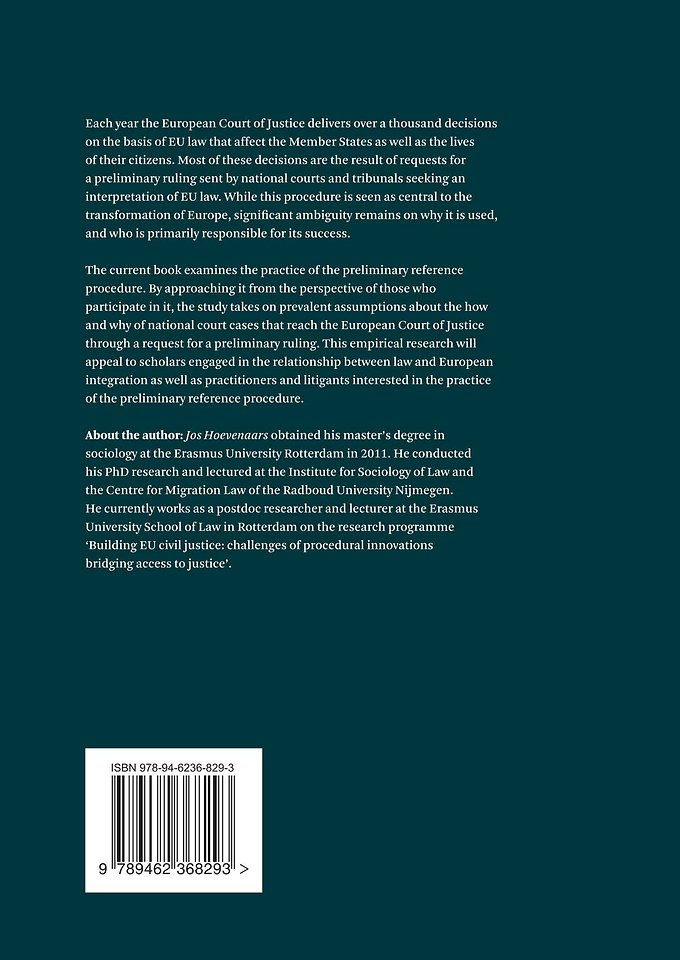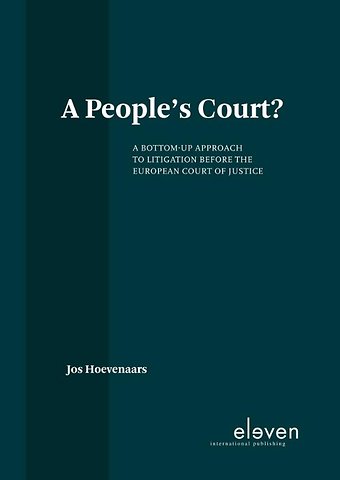A People's Court?
a Bottom-Up Approach to Litigation Before the Court of Justice of the European Union
Samenvatting
Each year the European Court of Justice delivers over a thousand decisions on the basis of EU law that affect the Member States as well as the lives of their citizens. Most of these decisions are the result of requests for a preliminary ruling sent by national courts and tribunals seeking an interpretation of EU law. While this procedure is seen as central to the transformation of Europe, significant ambiguity remains on why it is used, and who is primarily responsible for its success.
The current book examines the practice of the preliminary reference procedure. By approaching it from the perspective of those who participate in it, the study takes on prevalent assumptions about the how and why of national court cases that reach the European Court of Justice through a request for a preliminary ruling. This empirical research will appeal to scholars engaged in the relationship between law and European integration as well as practitioners and litigants interested in the practice of the preliminary reference procedure.
Trefwoorden
Specificaties
Inhoudsopgave
1 INTRODUCTION
1.1 Individual Litigants Before the European Court of Justice 1
1.2 Changing Power Relations in Europe 2
1.3 Euro-Litigation: A View from the Inside 4
1.4 Methodology 6
1.5 Aims and Limitations 13
1.6 Structure of the Book 14
PART I
2 PROMISES AND EXPECTATIONS
2.1 Introduction 19
2.2 The Promise of the European Court of Justice 19
2.3 The Promise of EU Law 21
2.4 Giving the Citizen a Role in European Law Enforcement 23
2.5 EU Law and the New ‘Public Power’ 25
2.6 Access to the European Court of Justice 26
2.7 An Infringement Procedure for the European Citizen? 29
2.8 Conclusion 32
3 THE POLITICAL ROLE OF THE ECJ
3.1 Introduction 35
3.2 Early Scholarly Interest in the Court of Justice 35
3.3 Competing Political Science Perspectives on European Integration 37
3.4 The Magic Triangle of the Legal System 39
3.5 Integrationist Dynamic: The Inter-Court Dialogue 40
3.6 Connecting the Citizen to EU Law 42
3.7 Participation Through Law Enforcement 43
3.8 Token Cases and Selecting on the Dependent Variable 45
3.9 Playing the Eurolaw Game: Indications of an Uneven Playing Field 47
3.10 The View from a Distance 50
3.11 Materialising the Individual Litigant 51
3.12 Conclusion 53
PART II
4 A LOOK BELOW THE SURFACE
4.1 Introduction 59
4.2 Preliminary References in Numbers 60
4.3 Intermediate Conclusion 67
4.4 On Proactive and Reactive Litigation 68
4.5 Litigant Characteristics 71
4.6 The ‘Irrational’ Litigant: Dealing with Assumptions of Interest 72
4.7 Reaching for that ‘Final’ Judgment 73
4.8 ‘Frivolous’ Litigation 75
4.9 Individual Persistence: Surviving the Legal System 77
4.10 Stakes and Impact: Perspectives on Success 79
4.11 Promises and Expectations: (Mis)understanding the Court 83
4.12 Conclusion 87
CASE STUDY A. CATERING EMPLOYEES
A.1 Introduction: Gaul v. the Romans 89
A.2 The Dispute 89
A.3 Organizing Legal Opposition 91
A.4 The Legal Battle 93
A.5 Effects of the Ruling 98
A.6 Deductions from a ‘Victory for the Little Guy’ 99
A.7 ECJ to the Rescue 100
A.8 Collective versus Collective 101
5 A COLLECTION OF INTERESTS
5.1 Introduction 103
5.2 Real and Nominal Litigants 103
5.3 Employing an Individual Case 107
5.4 The Transformation: How Individual Interests Become Collective 110
5.5 The Art of Soliciting a Reference 111
5.6 Cause Lawyering and the Balancing of Interests 114
5.7 Conclusion 119
CASE STUDY B. PENSIONERS ABROAD
B.1 Introduction: Between Social Rights and Free Movement 121
B.2 The Contested Policy 122
B.3 Consequences for Pensioners Living Abroad 124
B.4 Organizing Opposition 125
B.5 Extra-Legal Opposition 127
B.6 Legal Contestation: From Pillar to Post 129
B.7 Effects of the Legal Contest 136
B.8 Collective Mobilisation 137
B.9 Assigning Blame and Finding The Right Forum 138
6 LAWYERING EUROLAW
6.1 Introduction 141
6.2 Lawyers and References: Allocating Effects in Eurolaw Expertise 142
6.3 Allocating Resources 144
6.4 Going to Luxembourg 146
6.5 Legal Aid and References 147
6.6 Lawyers’ Motivation 150
6.7 Eurolaw Expertise 152
6.8 Coping Strategies 160
6.9 Macro Effects of the Allocation of Eurolaw Expertise 162
6.10 Conclusion 163
CASE STUDY C. FEES IN MIGRATION LAW
C.1 Introduction: Championing the Rights of Migrants 167
C.2 The Contested Policy 167
C.3 Organizing Opposition: Introducing the IOT 170
C.4 Extra-Legal Opposition to the Policy 171
C.5 The Decision to Take Legal Action 173
C.6 Legal Contestations 174
C.7 Effects of the Various Cases for Dutch Policy 178
C.8 Deductions From a Long Contest: Credentials of the Working Group 181
C.9 The ECJ as an Unintended Target 182
C.10 Government Stance as Push Factor 183
C.11 Advantages of Organised Opposition 185
PART III
7 CHALLENGES AND OPPORTUNITIES
7.1 Introduction 189
7.2 Opportunities in EU Law 190
7.3 The EU Legal System Reviewed 192
7.4 Awareness, Opportunity and the Litigability of EU Rules 195
7.5 Standing Rules and Strategically Choosing Cases 199
7.6 The National Court: Before and After Referral 202
7.7 Lessons from the Netherlands: Recipes for Getting Access 203
7.8 Networks and Alliances: A Learning Curve? 211
7.9 Conclusion 213
CASE STUDY D. INTEGRATION ABROAD
D.1 Introduction: Investigating an Invisible Case 215
D.2 The Contested Policy 215
D.3 Organizing Opposition 216
D.4 Legal Contestation 217
D.5 Government Intervention 221
D.6 The Aftermath 223
D.7 The Traveling Commission Opinion 225
D.8 Deductions from an Invisible Case 226
D.9 Changing Context, Same Questions? 227
D.10 The Withdrawal of References 229
8 PRELIMINARY REFERENCE AS A MULTIPLIER OF INTERESTS
8.1 Introduction 231
8.2 The European Commission: Repeat Player Par Excellence 232
8.3 The Commission as Guardian of the Treaties 233
8.4 Preliminary References as Alternative Enforcement 236
8.5 Two Pathways to Allying with the Ultimate Repeat Player 238
8.6 Mobilising the Commission 240
8.7 Unsolicited Alliances: The Commission Behind the Scenes 243
8.8 The Weight of Commission Involvement 245
8.9 The Commission as an Additional Opponent 246
8.10 The European Commission: Concluding Remarks 247
8.11 Member States as Repeat Players Before the ECJ 249
8.12 The Netherlands Before the ECJ 250
8.13 Preliminary References: Raising the Stakes 251
8.14 Member State Advantages Before the Court 253
8.15 Private Parties Versus Member States 254
8.16 Member States’ Control of the ECJ Docket 259
8.17 The Member States: Concluding Remarks 261
8.18 Conclusion 262
PART IV
9 CONCLUSIONS
9.1 Euro-litigation Empowering EU Citizens? 267
9.2 Understanding Individual Litigation before the ECJ 268
9.3 Participation-Through-Law and the Assumption of Interest 269
9.4 The Multifarious Functions of the Preliminary Reference Procedure 273
9.5 The Enforcement Role of Litigation 275
9.6 Cause Lawyering and Pressure Through EU Law 276
9.7 Reviewing the Dual Logic of Private Enforcement 279
9.8 Re-Positioning the Individual in the European Legal System 282
9.9 Methodological Reflections 284
9.10 Remaining Questions and Future Research Agenda 285
BIBLIOGRAPHY 291
APPENDICES 307
CURRICULUM VITAE 319
Anderen die dit boek kochten, kochten ook
Net verschenen
Rubrieken
- aanbestedingsrecht
- aansprakelijkheids- en verzekeringsrecht
- accountancy
- algemeen juridisch
- arbeidsrecht
- bank- en effectenrecht
- bestuursrecht
- bouwrecht
- burgerlijk recht en procesrecht
- europees-internationaal recht
- fiscaal recht
- gezondheidsrecht
- insolventierecht
- intellectuele eigendom en ict-recht
- management
- mens en maatschappij
- milieu- en omgevingsrecht
- notarieel recht
- ondernemingsrecht
- pensioenrecht
- personen- en familierecht
- sociale zekerheidsrecht
- staatsrecht
- strafrecht en criminologie
- vastgoed- en huurrecht
- vreemdelingenrecht









